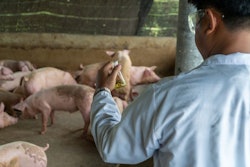
Latest move by Germany to keep the national pig herd free of African swine fever means controls on wild boar in affected states are set to become even tighter.
Over the past week, new cases of African swine fever (ASF) among European domestic pigs have been registered in Romania, Russia and Ukraine. South Africa has also recorded a number of new outbreaks.
In German states where ASF is present among the wild boar population, authorities may continue measures to reduce number of the wild animals. According to the federal agriculture ministry, minister Julia Klöckner was able to persuade the federal council (Bundesrat) to extend this authorization. It was introduced last year, and was originally only valid until next month.
Number of wild boar in Germany testing positive for the ASF virus has reached 915. According to the national veterinary agency, the Friedrich-Loeffler Institute, this is an increase of 67 from March 22. Latest cases were found in the same five districts of Brandenburg and one region of Saxony as previous outbreaks.
With 808 confirmed cases since September 2020, the eastern state of Brandenburg continues to be the worst-affected state. Positive cases have been detected in five districts, including most recently the city of Frankfurt (Oder), according to the agriculture ministry.
Neighboring Saxony is the only other state where ASF-positive cases have so far been detected among wild boar. Its total stood at 69 as of March 24. This is four more than the previous week, reports the agriculture ministry. All infected cases have been found in the district of Görlitz.
In March, Germany developed a crisis management plan aimed at keeping its pig farms free of the disease.
ASF situation in domestic pigs in Europe
Latest update from the European Commission (EC) puts the number of ASF outbreaks in domestic pigs so far this year at 324.
According to the EC Animal Disease Notification System, as of March 21, this is an increase of 42 from the previous report dated March 7. Of these, 39 were in Romania, bringing the country’s total to 304 so far this year. In 2021, Serbia has recorded a total of 17 outbreaks. Ukraine’s total remains at two, while the recently confirmed Polish outbreak has now been included in the EC system.
Officially registering new ASF in domestic pigs through the new reporting system of the World Organisation for Animal Health (OIE) have been Romania, Russia and Ukraine.
Over the past week, Romania’s veterinary authority has confirmed 52 further outbreaks of ASF in backyard herds of up to 92 pigs. These occurred across three broad regions of the country between mid-February and mid-March. Around 630 pigs were directly affected by these outbreaks.
In Russia, presence of the ASF virus was confirmed in mid-March at a farm with 324 pigs in Yaroslavl oblast. This is in the central federal district.
Absent from the central-western Ukrainian oblast of Vinnytsia since May 2020, ASF has resurfaced again. According to the official report to the OIE, the virus was detected at a farm with 368 pigs after four of the animals died in late March.
ASF has been “resolved” in the southern oblast of Kherson, according to a recent official report to the OIE. Ukraine’s animal health agency has recorded no further cases since a single outbreak at a farm there one year ago.
ASF situation in European wild boar
As of March 24, the EC system had registered 3,809 outbreaks of ASF among European wild boar so far this year. This is an increase of 724 from the previous status on March 7.
In Europe, Hungary has been worst affected, recording 1,217 outbreaks for the year in 2021 — an increase of 249 from the previous EC report two weeks earlier. Next are Poland with 905 outbreaks, followed by Romania (491), Slovakia (470), Germany (449), and Bulgaria (136). Cases have also been confirmed in four other European states this year — Estonia, Italy, Latvia and Lithuania.
Over the past 10 days, veterinary authorities in Hungary, Latvia, Romania and Russia have confirmed new cases to the OIE.
Poland’s chief veterinary office has published details of a further 50 ASF outbreaks involving 60 wild boar. These animals were found in six provinces between August 31 and September 15 last year, and confirmed shortly afterwards.
South Africa reports ASF in 4 provinces
Over the past 10 days, the national animal health authority has officially registered with the OIE new ASF outbreaks in four provinces.
With some of the cases dating back to mid-January, 11 outbreaks have been confirmed. These directly affected a total of 1,838 pigs. Apart from one farm with approximately 1,440 animals near Emfuleni in Gauteng in mid-March, other outbreaks were in herds of no more than 100 pigs.
As well as at the farm, there were three more outbreaks in Gauteng. Cases were confirmed at five locations near Cape Town (Western Cape Province). Also affected were one location in each of North West Province and Free State.
According to another report to the OIE, the authorities have declared the ASF situation “resolved” at a small farm in Letsemeng, which is in Free State. Two further mortalities occurred recently at this premises, after an outbreak in January.
View our continuing coverage of the global African swine fever situation.
















